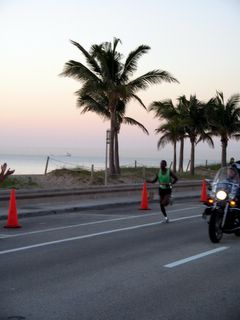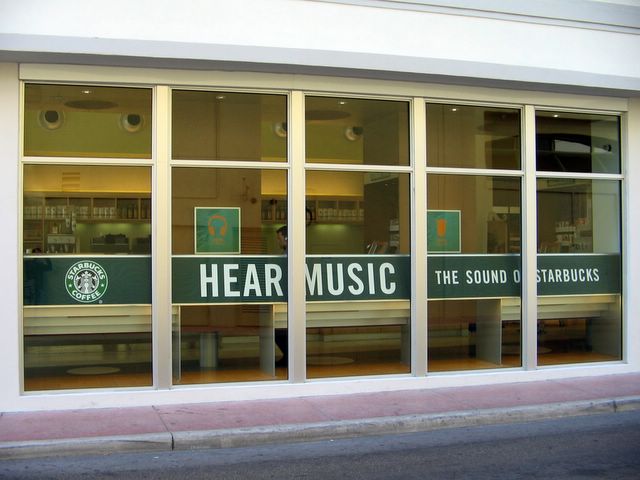But the afternoon belonged to the 11 musicians, whose effervescent and immensely characterful playing made the performance so delightful. Anchored by terrific keyboard work by duo-pianists Yukiko Sekino and Ciro Foderé, the New World members threw themselves into the off-kilter spirit of Saint-Saëns' musical bestiary with immense spirit and refined Gallic finesse. Particularly notable were bassist Matthew Heller's lumbering pachyderm, Alice Dade's graceful avian solos and Alucia Scalzo's witty cuckoo.
Tuesday, February 28, 2006
Carnival reviewed
Monday, February 27, 2006
Brokeback Mountain: "flying in the euphoric, bitter air"

...but saying not a goddam word except once Ennis said, "I'm not no queer," and Jack jumped in with, "Me neither. A one-shot thing. Nobody's business but ours." There were only the two of them on the mountain, flying in the euphoric, bitter air, looking down on the hawk's back and crawling lights of vehicles on the plain below...Ennis and Jack would be uncomfortable seeing their lives portrayed in a film, and even more dismayed by those who call it a "gay cowboy movie." Still, Brokeback Mountain is one of the most successful and moving films I've seen in a long time, and its great strength is that it makes you forget all the labels of genre and sexuality, and focus instead on a very universal story of love and loss.
- from "Brokeback Mountain" by Annie Proulx, The New Yorker, Oct. 13, 1997, p. 76.
The story unfolds as a series of revealing moments, exchanges, and encounters, beginning when Jack and Ennis meet and then following them over the course of 20 or so years. They are not talkative men, but Proulx finds an incredibly expressive language of gestures and terse phrases for them. The reader is left to interpret all that's left unsaid and untold. Here's a bit from a radio interview between author Annie Proulx and host Michael Silverblatt on KCRW's Bookworm:
The movie's director and screenwriters did a beautiful job of keeping the story's understated tone, and its minimalist style. The movie does have more episodes, and characters briefly mentioned in the story are fully realized, but none of it felt contrived or untrue to the original material. I suppose adapting this material into a full-length film presented a great challenge - the story has such a profound emotional and dramatic arc, but the events themselves are small and subtle. The conflicts and tensions are all hidden, appearing only in brief explosions of rage or grief.MS: The story is written in somewhat of the stoic way of these men. It's not insisting that you feel anything in particular – and as a result my emotions just leaped out through me unawares. It came as a real startlement to me.
AP: Right, I'm very happy to hear that because it means that the thing works the way I had hoped it would work. That for the reader what's inside is necessary to complete the story and fill it out, and put the meaning in it.
In a way it's like interpreting a piece of music, reading this story or watching the film - we're given only a sketch, an outline, but it contains all kinds of possibilities and layers of meaning. We add our own emotional experiences, and as a result the story relates to much more than just these characters or this time. Jack and Ennis say so little, but they draw the reader into their story, and we find ourselves reading our own stories through them.
AP: There's a universality there and I don't know where it came from – it just came, it just happened.I haven't seen enough of the Oscar-nominated films to make any authoritative predictions. Still, I found this film so effective, in its conception and its performances, that I would not be surprised to see Ang Lee and Heath Ledger making acceptance speeches next Sunday. The film's great accomplishment, I think, is not so much that it has broken new ground in the portrayal of homosexual relationships; but that it has made audiences see that these characters are not "queer" at all, in the sense of odd and unsympathetic. It has shown us an Ennis and Jack who, gay cowboys or not, are perfectly and tragically human just like us.MS: For me it's the longing for love that the story captures. There's this huge sense that these men, whatever lies they tell and refusals that they make, this love seems hard-wired into them and is unmitigatible, unavoidable, unignorable...
AP: And inexpressible.
MS: And inexpressible.
AP: The other thing that I wanted to mess with in this story is to get some idea of the complex plurality of human sexuality – the unclear lines, the drifts from one pasture to another. The back and forth and interplay, instead of this very rigid construct of him/her, he/she. It was interesting to me to put a lot of gray into the story and, again, count on readers to pull from their own lives and experience and thoughts what they knew about life and sex that contradicted the clearcut pattern that is given to us, you know, the coloring book of life that we get when we're little kids.
AP: I was surprised, I'd never even thought this story would get published. It was just the thing I was going to write and it was going to be written and then it was going to be there, but I didn't think of it as being published.
MS: Now tell me, because almost everyone would be angry with me if I didn't ask – but it's completely not a literary question: when you saw these actors, Jake Gyllenhaal and Heath Ledger, were they your characters?
AP: Fifty percent. Jake Gillenhaal made his own Jack Twist, and a very excellent Jack Twist it is too, a complex, quicksilver, beautiful, hungry, bitterly disappointed again and again character, who still manages to express considerable love and electricity.
On the other hand I found Heath Ledger's performance totally frightening because he got right inside my head. He got stuff that I did not know about Ennis and he got it right, and I was just blown away, I really was, by that performance. I thought it was indescribably excellent. I don't know how he did it, but he got that character to an impossible depth. He understood him incredibly well – I don't know how!
MS: That performance is one of the stunning things that there is to see in movies right now and for a long time too.
AP: I couldn't agree more.
Sunday, February 26, 2006
Saint-Saëns' "Carnival": a miraculous thing-ling
 Today's chamber music concert features Camille Saint-Saëns' Carnival of the Animals, which is as much a party as a piece of music. Someone told me that Saint-Saëns originally wrote it for a party, then later developed it for concert performances.
Today's chamber music concert features Camille Saint-Saëns' Carnival of the Animals, which is as much a party as a piece of music. Someone told me that Saint-Saëns originally wrote it for a party, then later developed it for concert performances.Our performance features as narrator Evelyn Lear, a retired operatic soprano who still has a radiant, beautiful stage presence. I wasn't familiar with her singing before this week, but the moment she walked on stage at a rehearsal on Thurday, it was clear that she was a veteran performer. All the musicians were a little awed by her presence, and afraid at first to say anything - when I did make a small suggestion about how to begin one of the movements, she gave me a kiss on the cheek and decided that I was to be the next Toscanini.
The poetry for this performance is by Ogden Nash, and
it is also quite fun and delightful. These pieces aren't really so much about animals, but people who behave like animals - cynical cuckoos, stubborn mules, mysterious fish, and of course, pompous elephants. That's the character I get to portray, in a famous double bass solo. It's a topic of some discussion just how vulgar and uncouth this piece should sound - in my opinion it has to have the proud nobility of the elephant, even if it might be a little clumsy and unrefined. Whatever the case, it has to be damned loud, which is always a fun challenge.
Also among Saint-Saëns' "animals" are pianists - in one of the funniest moments, he mocks the dogmatic scale-practicing habits of his fellow musicians. It made me think about how we musicians really do behave like animals sometimes, belting out our excerpts like some kind of bizarrely contorted mating call. There was a moment in rehearsal when all the strings were arguing over a bowing, whether a certain note should be up or down, or maybe up but with a very connected quality - we all sounded like a pack of chattering monkeys. Ms. Lear wanted to say something very gracious and sweet, but she could barely get a word in edgewise (by this point all our awe-struck humility had been forgotten!) Oh well, I guess we still have time to evolve...
The performance will be this afternoon at 3 pm, in the Lincoln Theatre. Also on the program are two chamber pieces by Maurice Ravel, his string quartet and Introduction and Allegro for harp and mixed ensemble. You can find out more at nws.edu.
Thursday, February 23, 2006
Chip Kidd's book and its covers
 I think what first intrigued me about Chip Kidd's Book One - Work: 1986-2006 were the thumbs. I'm always interested by people who model various parts of their bodies, like their fingers or elbows; and I suppose I have a somewhat vain idea that my own hands aren't so unattractive, at least for a bass player. Still, my thumbs look nothing like those on this book cover - they lack that elegant, molded roundness - so I guess I will have to humble my digital pretensions.
I think what first intrigued me about Chip Kidd's Book One - Work: 1986-2006 were the thumbs. I'm always interested by people who model various parts of their bodies, like their fingers or elbows; and I suppose I have a somewhat vain idea that my own hands aren't so unattractive, at least for a bass player. Still, my thumbs look nothing like those on this book cover - they lack that elegant, molded roundness - so I guess I will have to humble my digital pretensions.Even without those pretensions, this is a book that literally begs to be opened, and it's difficult to resist. After giving in to temptation, you find incredible visual interest on every page, from the layout and script, to the photography and images, and of course the book covers. Book covers have made Chip Kidd famous, and they make this book a great joy to skim, browse, or pore over... um... cover to cover. We've all been warned not to judge a book by its cover, but for many people books serve as affordable visual art objects. A great cover can not only decorate and illuminate the text it binds - it can even provide pleasing decoration for a meager home or apartment. My bookshelf is certainly the most visually appealing thing in my room.
And looking over these covers, I was surprised how many are not just attractive but intimately familiar, memorable and precious. Many of these covers sparked my first interest in a book, that initial curiosity which leads to tentative blurb-checking, inner cover fondling, then complete infatuation, and hours spent sprawled in bed, unable to put it down. Maybe the lust analogy goes a little far, but books really can inspire passion, and I might never have discovered some of my favorite authors, I realized, were it not for Chip Kidd's visually arresting, intellectually engaging designs.
It also renewed my appreciation for the work of designers in all forms. My twin brother Dan is a graphic designer, and while he doesn't do book covers, he and Chip Kidd probably struggle with many of the same issues of clarity and presentation. Ordinarily I am completely oblivious to these issues, so Dan doesn't even try to explain them - as you can see from my blog here, design has never been a strength or a priority of mine. Still though, I can tell when it's done well, and it inspires me to improve the ways I organize space, to refine my use of script and image, to reexamine how form relates to functionality - maybe even to clean my room. Right after I finish reading this gorgeous book.
Monday, February 20, 2006
Ft. Lauderdale's A1A marathon

FLRC volunteers in grass skirts await the field


the first runner I saw, with police escort


a steady stream of determined runners


a female race leader near mile 5


the sun rises over runners at Sunrise Blvd.


offering encouragement, near a big pink hotel


the half marathon race leader laps the pack


runners in all directions at NE 34th St.

Sunday, February 19, 2006
the power law theory of practicing
Gladwell puts it "if you were to graph the troubles...it wouldn't look like a bell curve. It would look more like a hockey stick. It would follow what statisticians call a 'power law' distribution - where all the activity is not in the middle but at one extreme." (The New Yorker, Feb. 13 & 20, 2006, p. 98)
I began to wonder if complex musical problems sometimes follow the same 'power law' distribution. We often practice as though our problems were broad and generalized, when in fact they tend to be localized and specific - a shift here, a rhythmic transition there, a tricky fingering somewhere else. Running whole pieces or long sections, we might gain a sense of continuity, but still never fix our 'power law' problems. And these kinds of problems can't be solved with casual approaches - they need serious, intensive, and frequent attention. Here's how Gladwell describes them in the context of social policy:
It's a matter of a few hard cases, and that's good news, because when a problem is that concentrated you can wrap your arms around it and think about solving it. The bad news is that those few hard cases are hard. They are falling-down drunks with liver disease and complex infections and mental illness. They need time and attention and lots of money.In fact one homeless man Gladwell profiles, Murray Barr, costed the state so much in emergency health care expenses that "it would have been cheaper to give him a full-time nurse and his own apartment." We all have our own 'falling-down drunk with liver disease' moments in our excerpts and solo pieces, I think, and the sooner we recognize them and work proactively to fix them, not just manage and maintain them, the better and more confident our performances will be.
- p. 101
Like giving free apartments to homeless people, this can sometimes go against our intuition. If we have half an hour to work on an excerpt, a conventional approach might be first to run it, then practice it slow, patch it together and run it again to test for improvement. The power law theory says that we should identify the phrases, gestures, or notes that are most problematic and isolate these, drilling them without even playing through the rest. Here's Gladwell on using limited resources:
There isn’t enough money to go around, and to try to help everyone a little bit—to observe the principle of universality—isn’t as cost-effective as helping a few people a lot. Being fair, in this case, means providing shelters and soup kitchens, and shelters and soup kitchens don’t solve the problem of homelessness. Our usual moral intuitions are little use, then, when it comes to a few hard cases. Power-law problems leave us with an unpleasant choice. We can be true to our principles or we can fix the problem. We cannot do both.These ideas of fairness are ingrained in our thinking, and difficult to resist. We feel that we should give a bit of attention to each person, each problem, or each phrase, even when that approach is clearly not the most efficient. We might not feel so morally obligated to play through an entire Tchaikovsky bass part, but it is a strong compulsion to at least run through all our excerpts each day. A friend who just won the principal horn job in Kansas City suggested to try to resist that compulsion, at least until the last couple of weeks before an audition. Running through an entire piece is just "rewarding" yourself for not getting it right, and deepening the habits that are causing those problems. He said that another successful audition candidate told him to keep a book of "places that suck" - copying out those isolated spots that just don't quite work - and focus on each of these every day.
- p. 104
I like this approach, because it seems to address how our memories actually work. For example, you might listen to the news while you eat breakfast in the morning. If later you try to recall what you heard, though, you probably won't remember a word or two from every sentence - you might not even recollect the point of all the stories. However, maybe one story, or a single fact, will stick in your mind - you'll repeat it to yourself or tell others as the day goes on. By the end of the day, you'll remember that fact with great precision, even if you've forgotten where you heard it or what you were eating at the time!
In musical preparation, we're not just aiming to remember, but to recreate something in minute detail, and even to free ourselves from reproduction by rote so we can attain real artistry. Still, it's always helpful to identify our obstacles and chronic problems - and perhaps find some practical, efficient ways of solving them.
Friday, February 17, 2006
the newest Starbucks: burning music, not coffee
 A new Starbucks on Lincoln Road would normally not merit any great notice - we already had two within four blocks. This one is exceptional, though: under the name 'Hear Music,' it aims to combine coffee and music CD concessions, along with lots of niftily innovative touches. For one, there's the 'Starbucks card,' which saves any favorite tracks you choose, allowing you to burn a compilation CD right there in the store.
A new Starbucks on Lincoln Road would normally not merit any great notice - we already had two within four blocks. This one is exceptional, though: under the name 'Hear Music,' it aims to combine coffee and music CD concessions, along with lots of niftily innovative touches. For one, there's the 'Starbucks card,' which saves any favorite tracks you choose, allowing you to burn a compilation CD right there in the store.Walking into the place on its first day of business last Monday, there was a palpable sense of excitement - people milled about with tall lattes and glazed expressions, admiring the wide selection of music. The nearest similarly well-stocked CD store is Specs Music down on 5th and Collins, so this store fills a pressing need, even without the frappuccinos.
I began to wonder what effect all the caffeine has on musical taste. Do we seek out frenetic, wired music to suit our manic state, or try to balance it out with soothing acoustic music? Are we more or less likely to buy on impulse after consuming a 7-layer brownie? And which makes for a more powerful stimulant, reggaeton or espresso?
 I would expect all of that sugar and caffeine to have some effects, though they may be different in every person. I'm not a complete teetotaller, but mostly avoid coffee - I just don't like to feel that wired and hyperactive. The caffeine buzz also seems to linger for an uncomfortably long time, provoking unusually bizarre thoughts and behaviors in me. Oh well, I guess it makes me a rarity, a Seattle area native who doesn't drink coffee.
I would expect all of that sugar and caffeine to have some effects, though they may be different in every person. I'm not a complete teetotaller, but mostly avoid coffee - I just don't like to feel that wired and hyperactive. The caffeine buzz also seems to linger for an uncomfortably long time, provoking unusually bizarre thoughts and behaviors in me. Oh well, I guess it makes me a rarity, a Seattle area native who doesn't drink coffee.It will be very interesting to see how this synergy between music and coffee plays out, though. Since the store is right across the street from the New World Symphony's Lincoln Theatre, there is sure to be a continuous stream of musicians and audience members there, listening and imbibing. Both the music and the drinks are bound to create a buzz; I hope they also inspire some intrepid listeners to come over to Lincoln Theatre and sample the live music of our orchestra - also a tastily intoxicating experience!

Tuesday, February 14, 2006
some lovely quotations
Romantic love has suffered a demotion following the wars of the sexes in recent decades, with the result that we’ve forgotten it is the source of some of our civilization’s greatest acts of heroism and genius. For what else did knights slay dragons in the Middle Ages, did Petrarch write poetry, did Dante take on The Divine Comedy, Zeus turn himself into a swan, and Penelope weave her gorgeous web? Even evolutionary psychologists say we are never so strong as when we are in love, never so poised for high achievement or fierce battle. (It has to do with dopamine levels, apparently.) Instead of trying to curb the power of this love plot in one of the sexes, as feminists like the late Carolyn Heilbrun have done, might it not be better to re-sanction it in both?
-Cristina Nehring, from Atlantic Monthly July/Aug 2005, “Fidelity with a wandering eye”
To fall in love is to create a religion that has a fallible god.
-Jorge Luis Borges
Love is too strong a word, but pleasure that is at all rooted in the flesh is helpful to literary work because it cancels all other pleasures, for instance the pleasures of society, those which are the same for everyone. And even if this love leads to disillusionment, it does at least stir, even by so doing, the surface of the soul which otherwise would be in danger of becoming stagnant.
- Marcel Proust, from The Captive, p. 239
If Holly could marry that “absurd foetus,” then the army of wrongness rampant in the world might as well march over me. Or, and the question is apparent, was my outrage a little the result of being in love with Holly myself? A little. For I was in love with her. Just as I'd once been in love with my mother's elderly colored cook and a postman who let me follow him on his rounds and a whole family named McKendrick. That category of love generates jealousy, too.
- Breakfast at Tiffany's by Truman Capote, p. 71-2
Well, in a kind of classical situation in life what would happen at that point is you’d have a broken heart and without much imagination but with the sense that you have to get over this, you suffer the loss of the love and life moves on and you have a scar in the place of it. In [the character Leo Gursky's] case he does something very, very different that I think takes a necessary leap of the imagination - he says, “She may well be the cause of my love but I am the source of that love, and if I am the source of it her existence is not necessary to my continuing love. What if I were to salvage that love whether she allows it or not, whether she receives it or not and what if it becomes the core of my own vitality of my life.” And through this act of insistence, and again I think an act of the imagination, he refuses the idea of loss, of the broken heart - he turns it into some material of which his life is based.
-Nicole Krauss, from an interview about her novel The History of Love
Monday, February 13, 2006
a bit more on Murakami
 The other day I quoted at length from Haruki Murakami's A Wild Sheep Chase - I hope I didn't give too much away - but I didn't mention that a new story by Murakami, "A Shinagawa Monkey", appeared in this week's The New Yorker magazine. Like A Wild Sheep Chase, it is a story very much concerned with names, those fragile bandages that hold our identities together. In AWSC, almost all of the characters are without names; while in "Monkey", a woman named Mizuki Ando find herself slowly losing her grip on who she is.
The other day I quoted at length from Haruki Murakami's A Wild Sheep Chase - I hope I didn't give too much away - but I didn't mention that a new story by Murakami, "A Shinagawa Monkey", appeared in this week's The New Yorker magazine. Like A Wild Sheep Chase, it is a story very much concerned with names, those fragile bandages that hold our identities together. In AWSC, almost all of the characters are without names; while in "Monkey", a woman named Mizuki Ando find herself slowly losing her grip on who she is.Both works are deft psychological balancing acts, spellbindingly executed - without giving away any more magical revelations, I wanted to share a bit from a great profile by Ian Buruma which explores some of the author's own traumatic discoveries:
Once, when Murakami was a child, he heard his father say something deeply shocking about his experience in China. He cannot remember what it was. Perhaps it was something his father had witnessed, or even something he did. But he remembers being terribly distressed. "Perhaps," he said, in his flat voice, which conveys intimate information without sounding intimate, "perhaps that is why I still cannot eat Chinese food." Had he never asked his father about China? "I don't want to," he said. "It must be a trauma for him. So it's a trauma for me as well. We don't get on well. Perhaps that is why I can't have children."That mixture of maddening vagueness, along with an utter clarity of cause and effect, runs through the recent story as well. We're constantly reminded in Murakami how our lives are affected by choices, both our own and those of people in distant times and places. Since I had noted the frequent disappearances of wives and girlfriends in Murakami's works, I was also very interested in this passage about the author's relationship with his wife, Yoko:
- "Becoming Japanese" by Ian Buruma, The New Yorker Dec. 23-30, 1996, p. 71
During my first interview with him, in his apartment in Tokyo, he left the room to make some tea. Yoko, who had been listening, suddenly observed, "Haruki is very bad at talking, you know. Sometimes I don't even know whether he loves me." I didn't quite know what to say. Yoko has none of the simpering diffidence that some people still expect from a Japanese wife. But this was not the sort of thing you expect to hear from someone you have just met. And - something unusual in Japan - she always used his first name, as though he were an American. Haruki, she said, hated Chinese food. Haruki couldn't even face a bowl of noodles. Yet Haruki was very interested in China. Again, I didn't quite know how to respond to this information, so I simply made a note of it...Just these small exchanges and glimpses are fascinating insights into Murakami's characters. It's well worth reading the whole article, if you like Murakami - it hasn't been published in book form as far as I know, but is of course included in The Complete New Yorker archive DVDs. Maybe I'll next read The Wind-up Bird Chronicle, which the profile described as Murakami's greatest and most violent novel so far - touching on the horrors and atrocities of WWII, events that could traumatize anyone, even a generation removed.
Murakami's system is to rise at five o'clock in the morning. Then he writes, runs, swims, writes some more, spends the evening with Yoko, and goes to bed at nine. He likes swimming and marathon running, because they don't involve other people. For comments on his writing, he relies on Yoko. "Editors are company employees," Murakami said. "They change jobs. You never know who you are dealing with. My wife, at least, will stick around."
Yoko looked up and said, "I'm not so sure about that."
A tiny smile creased Murakami's face. "For the time being, anyway."
Yoko deals with the outside world, and Haruki writes. It seems the perfect system, at least for a writer who likes to live in his head. She protects him, and he is faithful to her - except when he's working. To Murakami, writing a novel is like falling in love: "That is why I don't have affairs. My books are my love affairs."
- p. 69
Saturday, February 11, 2006
'Who can sleep with such inexpressibleness?'
 So much of Haruki Murakami's novel A Wild Sheep Chase is so clever, witty, and charming, it comes as a shock when things get dark. Here's the unnamed narrator, describing his lone encounter with actual sheep:
So much of Haruki Murakami's novel A Wild Sheep Chase is so clever, witty, and charming, it comes as a shock when things get dark. Here's the unnamed narrator, describing his lone encounter with actual sheep:The instant I entered the sheep house, all two hundred sheep turned in my direction. Half the sheep stood, the other half lay on the hay spread over their pen floors. Their eyes were an unnatural blue, looking like tiny wellsprings flowing from the sides of their faces. They shone like glass eyes which reflected light from straight on. They all stared at me. Not one budged. A few continued munching away on the grass in their mouths, but there was no other sound. A few, their heads protruding from their pens, had stopped drinking water and had frozen in place, fixing their eyes on me. They seemed to think as a group. Had my standing in the entrance momentarily interrupted their unified thinking? Everything stopped, all judgement on hold. It took a move by me to restart their mental processes...That passage made me think of a conductor standing up in front of an orchestra for the first time - though I don't want to equate myself and my fellow musicians with sheep! The simple cadences of Murakami's writing seem to lead the reader to a series of imaginative leaps, like a conductor inspiring an orchestra to find new poetry and meaning in a familiar score. For his part, Murakami is often at his most poetic on the most mundane subjects:
- p. 257-8
I switched off the television and toppled over onto the bed with my shoes still on. All alone, I stared up at the stain-blotched ceiling. Reminders of persons long dead and forgotten.Of course, much more happens than just lying in bed and looking into the eyes of sheep - there is a tone though, cool, thoughtful, a little distant and yet oddly expressive, which sustains throughout. There is very little wild chasing, and so maybe the title is itself a part of the pervasive irony. The narrator has been assigned a quest, to find one particular sheep which may or may not exist somewhere in Japan. He is not especially enthusiastic in the pursuit of that sheep - though it does provide an excuse for a month-long vacation with his (also unnamed) girlfriend, who has some mysterious special powers, along with extraordinarily beautiful ears.
The room changed colors to the pule of neon lights. My watch ticked away by my ear. I undid the band and tossed it onto the floor. Traffic sounds came in soft chorus, layer upon layer. I tried to sleep, but without success. Who can sleep with such inexpressibleness?
- p. 350
The sheep he seeks seems also to be magical, capable of possessing people and granting them special abilities:
"The sheep that enters a body is thought to be immortal. And so too the person who hosts the sheep is thought to become immortal. However, should the sheep escape, the immortality goes. It's all up to the sheep. If the sheep likes its host, it'll stay for decades. If not - zip! - it's gone. People abandoned by sheep are called the 'sheepless.' In other words, people like me."This character, known as 'The Sheep Professor,' is only the first to be inhabited by the magical sheep, and discovering its whereabouts is no easy task. Just when it seems he is about to find it, the narrator loses his girlfriend and comes to a startling realization about the mission he's been assigned. Girlfriends in Murakami novels have a tendency to disappear suddenly and completely, just like that mystical sheep, leaving their partners as dejected and alone as the 'sheepless.'
Chomp, chomp.
- p. 222
In fact, I began to see this fickle, possessive, and elusive sheep as a symbolic stand-in for the infatuation of love itself. There is a feature article in the current National Geographic Magazine which traces the chemical processes of love's early stages:
What [anthropologist Helen] Fisher saw fascinated her. When each subject looked at his or her loved one, the parts of the brain linked to reward and pleasure—the ventral tegmental area and the caudate nucleus—lit up. What excited Fisher most was not so much finding a location, an address, for love as tracing its specific chemical pathways. Love lights up the caudate nucleus because it is home to a dense spread of receptors for a neurotransmitter called dopamine, which Fisher came to think of as part of our own endogenous love potion. In the right proportions, dopamine creates intense energy, exhilaration, focused attention, and motivation to win rewards. It is why, when you are newly in love, you can stay up all night, watch the sun rise, run a race, ski fast down a slope ordinarily too steep for your skill. Love makes you bold, makes you bright, makes you run real risks, which you sometimes survive, and sometimes you don't.In A Wild Sheep Chase, Murakami has one character describe the rapture of sheep-possession in a similar light:
"It's not something I can explain in words. It's like, well, like a blast furnace that smelts down everything it touches. A thing of such beauty, it drives you out of your mind. But it's hair-raising evil. Give your body over to it and everything goes. Consciousness, values, emotions, pain, everything. Gone. What it comes closest to is a dynamo manifesting the vital force at the root of all life in one solitary point of the universe."The narrator falls very much in love, though with a girl rather than a sheep. It is amusing to watch as he adores his girlfriend's perfect ears; it is even more heartbreaking to watch him struggle with losing her. The sheep has a similar effect on its hosts - they become obsessed with it, and all the powers it carries, only to realize that rather than using those powers, they have been used by the sheep. And in this novel there is no happy reconciliation for the sheepless, or the love-less:
- p. 335
"What happened to her?"
"She's okay. Perfectly well," said the Rat. "Only there's nothing that you'd find attractive in her anymore. Sad, but that's how it is."
"How's that?"
"It's gone. Evaporated. Whatever it was she had, it's not there anymore."
I couldn't bring myself to say anything.
- p. 338
 Anyone who has had his caudate nucleus lit up brilliantly, only to fade completely, can sympathize with the pain of the narrator's loss. There is a beautiful moment in the third movement of Berlioz' Symphonie Fantastique, also very much a work about infatuation and loss. A simple tune on an English horn - a shepherd's theme, in fact - is echoed in the distance at the beginning of the movement, then develops into a lovely theme of increasing longing and passion. At the end, in good classical form, the shepherd's theme returns. But this time it is answered only by silence, and the rumble of an approaching storm.
Anyone who has had his caudate nucleus lit up brilliantly, only to fade completely, can sympathize with the pain of the narrator's loss. There is a beautiful moment in the third movement of Berlioz' Symphonie Fantastique, also very much a work about infatuation and loss. A simple tune on an English horn - a shepherd's theme, in fact - is echoed in the distance at the beginning of the movement, then develops into a lovely theme of increasing longing and passion. At the end, in good classical form, the shepherd's theme returns. But this time it is answered only by silence, and the rumble of an approaching storm.We've all heard that saying 'Tis better to have loved and lost...', but I think that better or worse is hardly the point. Love changes us, it makes us feel differently, think differently, maybe it even reorganizes the chemical processes in our brains. In the end, it's difficult to calculate what we have gained by loving, but impossible to express what we have lost without it!
addictions, art, and the ovine
Among the fixes I get from reading are the bewildering coincidences and convergences between books, life, and other intangible things. For example, a few weeks ago I picked up a volume of Philip Roth, and started reading his political satire Our Gang. All the joking about Nixonian doublespeak, and the commitment to the rights of the unborn at the expense of the born, seemed startlingly relevant and hilarious. Then I got to the long speech in which he lays out the grounds for an invasion of the pro-pornographic regime of Denmark. At that point, I put the book down, thinking it far too corny - who would attack peaceful, kind, harmless Denmark? Then a Danish cartoon inspired much of the Muslim world to want to do just that.
This kind of bizarre coincidence is hardly the exception - often it feels like I've stumbled into the plot of a Murakami novel, even when I'm not reading Murakami. That's been my latest obsession lately though, as I've been entranced by the novel A Wild Sheep Chase. More to come soon (this time I promise!) about that novel, its connection to Berlioz and the Symphonie Fantastique, as well as (sigh...) loneliness and Valentine's Day.
Wednesday, February 08, 2006
as they say in France, 'ooga booga!'
The New World Symphony program this weekend offers a chance for some making up in time for Valentine's Day, with music by Poulenc, Ravel, and Berlioz. Last weekend Deco Drive anchor Louise Aguirre introduced Ravel's Bolero as "the greatest make-out music of all time" (no one in that audience seemed to be making out though, as far as I could tell). This program is full of equally passionate, evocative music. French music is not just romantic, colorful, and charming, though - and at times it can be downright scary and grotesque.
That's definitely the case with Berlioz' Symphonie Fantastique, a lover's wistful fantasies of narcotics, murder, witchcraft, decapitation, dancing, and sheep (not necessarily in that order). Guest conductor Stéphane Denève has been encouraging us to cast off our inhibitions and indulge in all the flamboyant, impetuous, arrogant, and stomach-churning excesses we can manage. At one point in the first movement he asked us to hear the music as less orderly, more terrifying - to make it say "ooga booga!"
American orchestra players are addicted to clarity, and so making the leap to craziness is scary and quite difficult. We reflexively retreat to our comfortable unanimity, only to have our Gallic guest conductor provoke another round of mass hysteria. I'm not sure we've quite realized what he is going for - but he has definitely drawn some startling effects from the orchestra. A percussionist cracked one of the huge bells in the fifth movement Dies irae, and we string players struggled to maintain control of our own equipment in a flurry of down-bows at the end of the fourth movement march.
It wouldn't be much of a love affair, though, if everything were always controlled and comfortable. More to come about this program, which will be performed twice this weekend at Lincoln Theatre: on Saturday at 8 pm and Sunday at 3. Visit the New World Symphony website for more information.
Friday, February 03, 2006
youth will be served
 As an orchestra of young musicians, the New World Symphony probably suffers from some of the problems of youth: we want to be fun, innovative, even a little wacky, but we also want to be taken seriously and respected artistically. An article in this week's Miami New Times, "Beach Blanket Beethoven" by Emily Witt, reviews one recent attempt.
As an orchestra of young musicians, the New World Symphony probably suffers from some of the problems of youth: we want to be fun, innovative, even a little wacky, but we also want to be taken seriously and respected artistically. An article in this week's Miami New Times, "Beach Blanket Beethoven" by Emily Witt, reviews one recent attempt.Witt's piece is more society column than music review, beginning with a summary of what everyone was wearing:
Stacey Glassman, blond and enthusiastic, teetered on a stage by the pool of the Raleigh Hotel in a cotton-candy pink, Marilyn Monroe-inspired halter-dress and heels. Behind her, nine New World Symphony musicians sat or stood according to the demands of their instruments. Most were in their midtwenties and looked their recital best — apparently happy to be out of the traditional black-and-white penguin suits for once.Actually, we almost never wear those traditional penguin suits for NWS concerts, preferring to go with all-black suits for a hipper (if somewhat mafioso) vibe. At these kinds of events the slick packaging and catch-phrases can often outweigh the musical content, as much as we would all like to move past pretenses. Witt seems to share this goal, but her comments and interviews with performers and audience members only seem to devolve into more pithy phrases: "too short" or "it's different".
Witt's concluding lines seem to underline the cheapening effect, making the whole thing sound contrived and hollow:
Marian Morgan, another attendee, who gave her age as "old enough" but guaranteed she would always consider herself "both young and professional," confessed disappointment: "As an older young person, I don't think they're giving the audience a chance to relax in to the music," she explained. "It sort of cheapens it into another South Beach thing."I suppose I share some of Ms. Witt's frustrations with these sorts of gatherings. Too often we try to please new audiences by presenting things that are either poorly prepared, lacking in substance, or which bore us to tears, with inevitably disappointing results. I can't speak about this specific event though, since I wasn't there - I went to hear the Cleveland Orchestra play at the Broward Center instead. That program included a celebrated warhorse (the Tchaikovsky Violin Concerto), a seldom-heard symphony (Elgar's First), and a sensationally virtuosic overture ('Scapino' by William Walton). In other words, the most traditional kind of program - and yet the result was fantastically moving and inspiring, since it was performed with such conviction."We wanted to keep the energy up," [musical arranger Dustin] Budish responded.
By 7:30 p.m. the guests began to depart, passing by a sign that read "Friends of New World Symphony, Private Event" and picking up complimentary gift bags on the way. Inside? Plum-color nail polish by Goldie cosmetics, Smashbox lip gloss, Frizz-Ease hair products, and a subscription card for Friends of New World Symphony.
I suppose the lesson is that getting the audience in the seats, or on the patio, means little if we don't give them something singular and meaningful to listen to. It's all just so much cosmetics and packaging, until we let the music provide the gloss and the polish.
Tonight and Saturday evening we are playing two "Community Concerts" at the Lincoln Theatre, with a program of familiar showpieces: Rimsky-Korsakov's Capriccio Espagnol, Gershwin's Rhapsody in Blue, and Ravel's Bolero. Both performances will be preceded by cocktail receptions sponsored by Bacardi, and the intent is to draw that elusive young professional audience. Hopefully they will go home excited about what we are playing, and not just what we were wearing!

